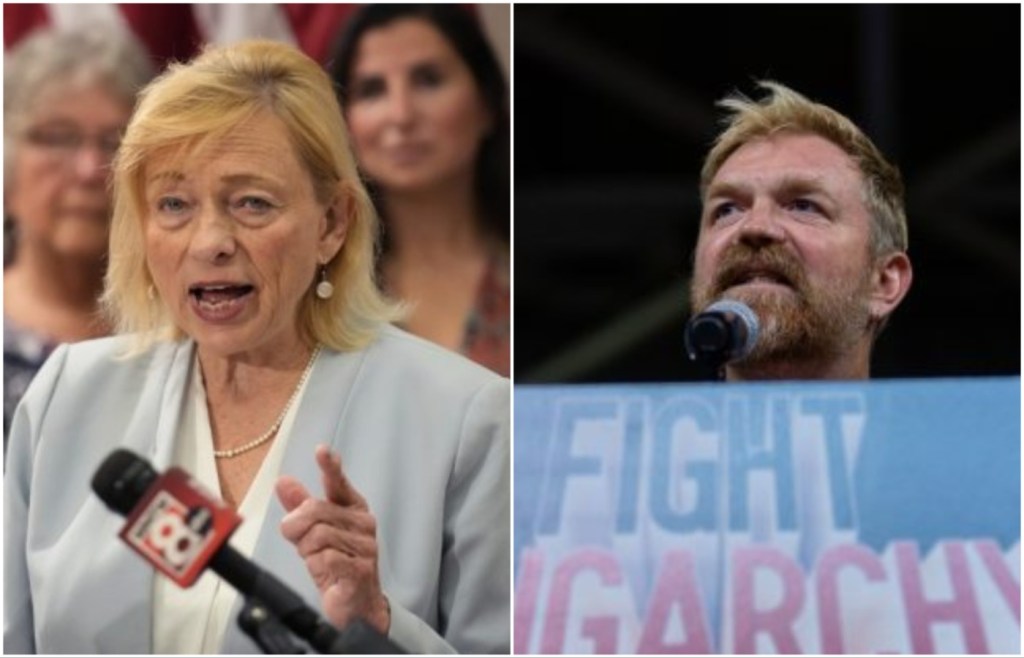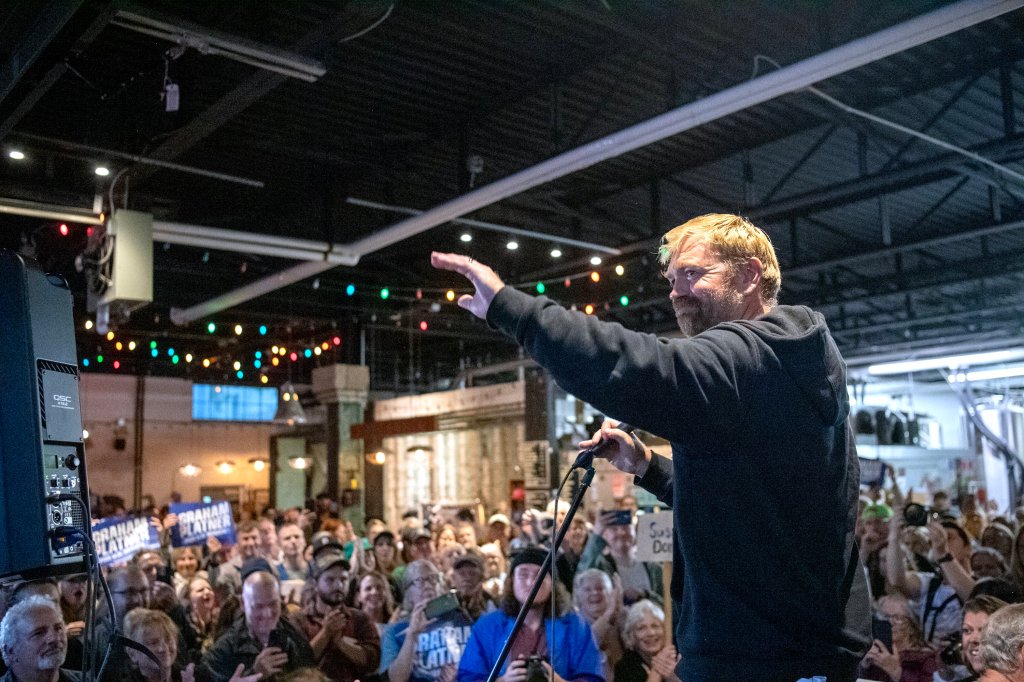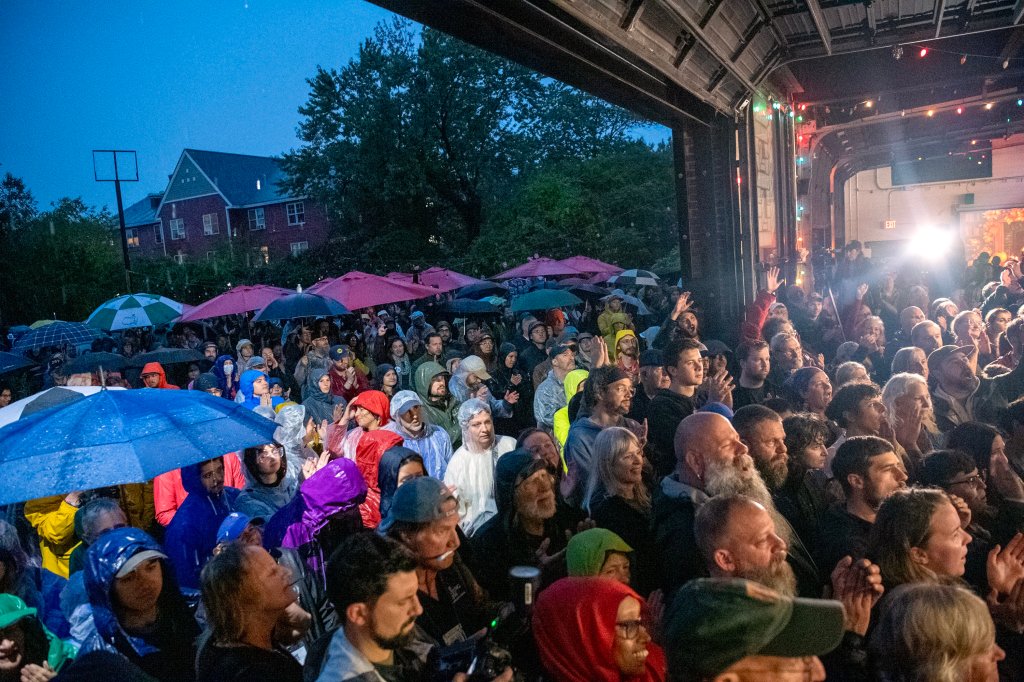
A potential U.S. Senate primary between Gov. Janet Mills and other Democratic candidates – led by Hancock County oyster farmer Graham Platner – highlights a broader national struggle as the party tries to redefine itself and win back voters after the 2024 presidential election.
Platner drew a big crowd during a visit Thursday to Portland, where his pledge to stand up to corporate interests and fight for working-class Mainers elicited rounds of applause. Many people waited in the rain to take selfies with him after the event.
Meanwhile, two-term Gov. Janet Mills, who is seriously considering a run, has been touring the state with campaign-like stops this week in Brunswick, Caribou and Houlton.
The primary is still eight months away, but the race to take on Sen. Susan Collins, a five-term Republican incumbent, is already generating plenty of buzz.
National media have been quick to shower Platner, a military veteran and oyster farmer, with attention while also speculating on a potential run by Mills, who is seen by some Democrats as their best chance of unseating Collins.

The race comes as President Donald Trump’s reelection has given rise to more Democratic angst, clearing the way for newcomers like Platner to build their campaigns and making it harder to win as an incumbent or established leader, said Jeremy Mayer, a policy and government professor at George Mason University.
“Democrats are furious at the establishment for not stopping Trump, and if you look at Platner’s ads, he’s trying to feed off that energy,” Mayer said.
The race in Maine is among a handful of Democratic Senate primaries nationally that are pitting party leaders against progressive newcomers. The New York City mayor’s race is another notable example of the dynamic, where the party’s two top leaders in Congress, Senate Minority Leader Chuck Schumer and House Minority Leader Hakeem Jeffries, have held off on endorsing primary winner and front-runner Zohran Mamdani, a 33-year-old New York state assemblyman and democratic socialist.
In the Michigan Senate race, Schumer is said to back Rep. Haley Stevens, a member of Congress since 2019, while Sen. Bernie Sanders, the Vermont independent and standard bearer of the progressive movement, endorsed Abdul El-Sayed, a former health official.
Sanders also campaigned with Platner during a Labor Day rally in Portland, and some of the staff who have worked for Mamdani are also working for Platner.
Platner, in an interview Friday, said he doesn’t see the race as being about moderate versus progressive or established candidate versus newcomer, but rather about voters being frustrated generally with a system that doesn’t work and looking for something else.
“Nobody thinks that the system we live in is built to support them and is built with their interests in mind,” he said. “That’s why I’m running.”
Platner has been critical of Schumer and said Friday that he and other leaders of the Democratic party haven’t done enough to counter Trump.
“The best we’re getting is still trying to negotiate with the Trump administration like it’s an equal partner that’s going to care about negotiations. … So whoever’s in charge of that clearly shouldn’t be,” he said.
Spokespeople for Gov. Mills did not respond to questions about the Senate race for this story.
Mills has been rumored to be the preferred candidate of national party leaders. Mark Brewer, chair of the University of Maine political science department, said that’s for good reason. Maine’s first first female governor is a proven two-time winner of statewide elections.
“Party leaders, more than anything else, they want to win,” Brewer said. “They’re going to back the (candidate) that gives them the best chance of winning.”
Mills also has the benefit of being able to point to a prominent example of personally standing up to Trump. The governor got into a short but heated exchange with the president while at an event for governors at the White House in February, telling Trump she would see him in court in response to his attack on Maine because it allows transgender athletes to compete in girls sports.
The exchange boosted the governor’s public profile, with some political scientists saying at the time that it could help with national fundraising should she choose to enter the Senate race.
David Farmer, a Democratic political strategist in Maine, said voters in the primary will be looking for the candidate who has the best chance of beating Collins and who shows they can stand up to the Trump administration, like Mills did in February.
“Platner has captured that rhetoric and I think that’s important,” Farmer said. “With Mills, she has shown she will stand up directly to the president when challenged face to face.”

Still, Mayer, the professor from George Mason, said favorability is not always on the side of the person with the most experience these days.
“In an era where the president of the United States never held elected office before he ran for president, it isn’t as strong a case to be an incumbent as it used to be,” he said.
Policy-wise, Mills has taken more progressive stances on some issues, such as signing an expansion of Maine abortion law in 2023 that advocates said provided some of the strongest abortion rights in the country. She is more moderate on other issues, like gun control.
Platner on Thursday used his hourlong town hall event at Bunker Brewing to touch on a variety of issues, including Maine’s housing and affordability crisis. Some aspects of his platform are likely to appeal to more progressive voters, such as his support for tribal sovereignty and union workers, and his firm condemnation of the war in Gaza as a genocide.
About 1,400 people attended, according to the campaign, which made for a crowded experience as only around half of attendees were able to squeeze into the venue’s indoor space while others stood in a rainy parking lot and listened through the open doors.
Brewer, from the University of Maine, said the crowd size was unusual for an event being held so far out from the election and hosted by a candidate who up until recently was politically unknown. But he also noted that it was unusual for Platner’s campaign to make the media splash it did upon launching and to raise as much money as he has so far. (Platner’s campaign said Friday they’ve raised $2.5 million in the first month.)
Still, there are a half-dozen other Democrats who are also vying for the chance to challenge Collins, including Dan Kleban, of Cumberland, the co-founder of the Maine Beer Co.; Jordan Wood, a former congressional staffer from Bristol; and David Costello, a Brunswick Democrat who ran unsuccessfully last year against Sen. Angus King.
Daira Smith-Rodriguez, a Biddeford Democrat who spent nearly 15 years as a civilian contracting officer for the U.S. Air Force, announced her candidacy last week.
And Mills has said she expects to make a decision by November.
“My guess is if Mills gets in, that really kind of shrinks the space that’s available for an outsider non-establishment type candidate,” Brewer said. “I would think it would shrink it to one, but certainly not more than two, that would have any kind of meaningful chance.”

We invite you to add your comments. We encourage a thoughtful exchange of ideas and information on this website. By joining the conversation, you are agreeing to our commenting policy and terms of use. More information is found on our FAQs. You can modify your screen name here.
Comments are managed by our staff during regular business hours Monday through Friday as well as limited hours on Saturday and Sunday. Comments held for moderation outside of those hours may take longer to approve.
Join the Conversation
Please sign into your CentralMaine.com account to participate in conversations below. If you do not have an account, you can register or subscribe. Questions? Please see our FAQs.